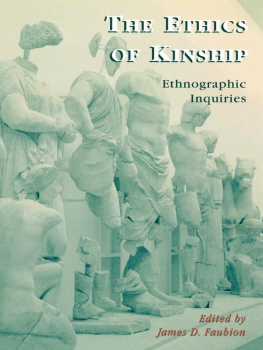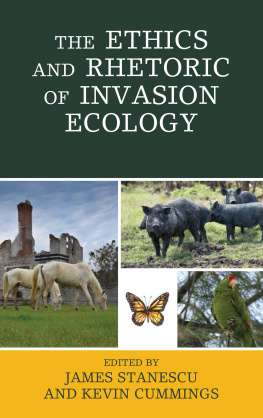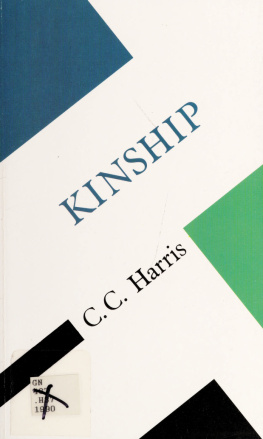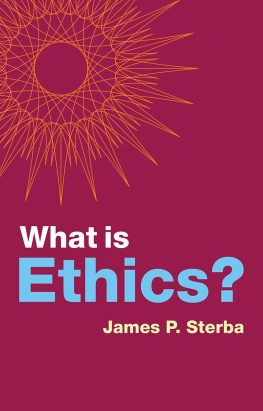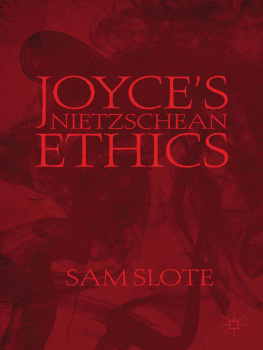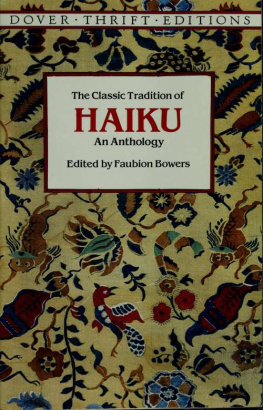Faubion James - The Ethics of Kinship
Here you can read online Faubion James - The Ethics of Kinship full text of the book (entire story) in english for free. Download pdf and epub, get meaning, cover and reviews about this ebook. year: 2013, publisher: Rowman & Littlefield Publishers, genre: Home and family. Description of the work, (preface) as well as reviews are available. Best literature library LitArk.com created for fans of good reading and offers a wide selection of genres:
Romance novel
Science fiction
Adventure
Detective
Science
History
Home and family
Prose
Art
Politics
Computer
Non-fiction
Religion
Business
Children
Humor
Choose a favorite category and find really read worthwhile books. Enjoy immersion in the world of imagination, feel the emotions of the characters or learn something new for yourself, make an fascinating discovery.
- Book:The Ethics of Kinship
- Author:
- Publisher:Rowman & Littlefield Publishers
- Genre:
- Year:2013
- Rating:5 / 5
- Favourites:Add to favourites
- Your mark:
- 100
- 1
- 2
- 3
- 4
- 5
The Ethics of Kinship: summary, description and annotation
We offer to read an annotation, description, summary or preface (depends on what the author of the book "The Ethics of Kinship" wrote himself). If you haven't found the necessary information about the book — write in the comments, we will try to find it.
The Ethics of Kinship — read online for free the complete book (whole text) full work
Below is the text of the book, divided by pages. System saving the place of the last page read, allows you to conveniently read the book "The Ethics of Kinship" online for free, without having to search again every time where you left off. Put a bookmark, and you can go to the page where you finished reading at any time.
Font size:
Interval:
Bookmark:
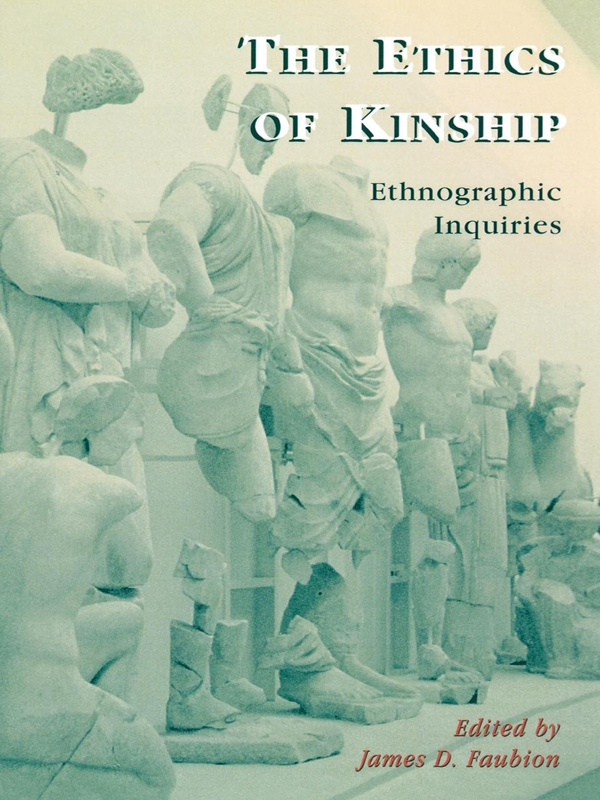
This volume is appearing later than I had originally planned, and the responsibility for its delay is entirely my own. I would like to thank all the contributors for their patient tolerance of my distraction. The volume bears many of the marks of the Department of Anthropology at Rice University, where I have been teaching for more than seven years. I thank my students, graduate and undergraduate, for the ongoing inspiration and stimulation that they have provided me. I thank the chair, George Marcus, for his unflagging support and his critical readings. Thanks, too, to Lamia Karim, Kathryn Milun, and Paul Rabinow for their comments on my introduction. On behalf of all the contributors, I would especially like to thank Kath Weston, who revealed herself ex post facto to have undertaken to review the volume for Roman & Littlefield, and whose learned, generous, and acute scrutiny has been of great benefit to all the works that follow, mine included. I would also like to take this opportunity to thank the Rice University Center for the Study of Institutions and Values and Center for the Study of Cultures, for having offered financial support for the conference out of which the volume grew; and Carole Speranza, for having put up with it all.
Carolyn Babula is a doctoral candidate at Rice University in the Department of Anthropology. She is currently conducting her field research in New York City on vintage clothing, public and private collections of clothing, and seasonal collections of clothing, as tangible invocations of the past at the end of the millennium.
Jamila Bargach teaches anthropology and social science at the National School of Architecture in Rabat, Morocco. She is the author of Nothing above Family (2001).
John Borneman , professor of anthropology at Princeton University, received his Ph.D. in 1989 from Harvard University, and he has done fieldwork in Germany, Central Europe, and Lebanon. His current research focuses on the symbolic forms of political identification and authority, and on issues of accountability, justice, and violence. From 1991 to 2001 he taught at Cornell University, and he has been guest professor at the University of California, Berkeley, Stockholm University (Sweden), Bergen University (Norway), and Senior Fulbright Professor at Humboldt Universitaet zu Berlin (Germany). He has written widely on issues of kinship, sexuality, nationality, justice, and political form. His publications include Belonging in the Two Berlins: Kin, State, Nation (1992) , Settling Accounts: Violence, Justice, and Accountability in Postsocialist States (1997), and Subversions of International Order: Studies in the Political Anthropology of Culture (1998).
Stanford W. Carpenter is a doctoral candidate in the Department of Anthropology at Rice University. He is currently working on a dissertation examining the personal experiences and the source materials of comic creators that affect the representation of race, gender, and ethnicity in comic books. Carpenter is a researcher at the Friends Research Institute and an associate at the Smithsonian Institution Center for Folklife and Cultural Heritage
Nityanand Deckha received his Ph.D. in Anthropology from Rice University in 2000. His current writing focuses on contemporary urban life and space, including Repackaging London: Spatial Politics in the Global City, based on his doctoral dissertation. Most recently, he has worked as a professional anthropologist in advertising in New York.
James D. Faubion is associate professor of anthropology at Rice University. He is the author of Modern Greek Lessons: A Primer in Historical Constructivism (1993) and of the forthcoming Shadows and Lights of Waco: Millennialism Today. His edited volumes include Rethinking the Subject: An Anthology of Contemporary European Social Thought (1995) , Essential Works of Michel Foucault, Volume 2: Aesthetics, Method, Epistemology (1998) , and Essential Works of Michel Foucault, Volume 3: Power (2000) .
Laurel George is a doctoral candidate in anthropology at Rice University. Her research addresses the patterning of the funding of contemporary U.S. choreography, a topic on which she published in the volume Corporate Futures (1998) and in the journal Terrain (1999).
Lamia Karim is a graduate student in anthropology at Rice University. Her research interests include women in South Asia, immigration, anthropology of NGOs and development, and the study of alternative political processes in a globalized world order.
Susan Ossman is the author of Picturing Casablanca, Portraits of Power in a Modern City (1994) and Three Faces of Beauty: Casablanca, Paris, Cairo (2001), and editor of Miroirs Maghrbins, Itinraires de soi et paysages de rencontre (1998). She teaches at the American University of Paris.
Kristin Peterson is a doctoral candidate in the Department of Anthropology at Rice University. She is currently conducting dissertation research on global trade, biotechnology, and access to essential medicines in Africa.
Deepa S. Reddy graduated from the Department of Anthropology at Rice University with a thesis on Hindu ethnicism and womens activism in India. She teaches anthropology at the University of Houston, Clear Lake.
Denise Youngblood is a doctoral candidate in anthropology at Rice University. A native of Trinidad, Youngblood is a former consultant on culture and multiculturalism to the government of Canada, and to several NGOs on international policy analysis and global education. She also functioned as an intercultural specialist for corporations such as Prudential International. In recent years, she moved from the position of managing editor for a strategic intelligence Internet publishing company, CountryWatch.com , to become vice president of research and development.
John Borneman
Since the inception of the discipline of ethnology, and later anthropology, in the late nineteenth century, a major goal of its practitioners has been to find sets of practices and institutions that would enable the universal translatability of culture, thus grounding the human being as object of knowledge. Early anthropologists were thoroughly influenced by the growing paradigm of sexuality, what Foucault (1978: 15456) parodied as the new truth worth dying for... that agency which appears to dominate us and that secret which seems to underlie all that we are. But they predicated the human instead in reproduction and subsumed sex into the institution of marriage. They claimed to have identified and then industriously named a wide variety of regulative forms comparable to the marital arrangements in their own countries of origin including primitive promiscuity, marriage by capture, marriage by purchase, marriage by right, group marriage, primitive marriage, communal marriage, levirate, ghost marriage, monogamy, polyandry, polygyny, sham marriage, and love marriage.
Within half a century, they shifted their focus to kinship and developed two paradigmatic schoolsdescent theory and alliance theorythe most forceful proponents being A. R. Radcliffe-Brown and Claude Lvi-Strauss, respectively. Descent theory was organized according to principles of consanguinity or shared substance, alliance theory on principles of affinity or marriage. Critiques of kinship theory accumulatedfor its nonuniversality, overformalization, and lack of coherence as a domainand in the early 1970s many anthropologists turned to gender, which was frequently combined, or sometimes subsumed, within an analysis of prestige, status, and power. This is not to say that each object of knowledge replaced in turn a prior one or that marriage ever lost its centrality in analysis. Rather, each successive generation of anthropologists subsumed the prior object into a new one by making it secondary to or derivative of other units of analysis without in fact calling into question the initial object of research. In other words, sexuality became derivative of marriage, marriage of kinship, kinship of gender, and gender of prestige and power.
Font size:
Interval:
Bookmark:
Similar books «The Ethics of Kinship»
Look at similar books to The Ethics of Kinship. We have selected literature similar in name and meaning in the hope of providing readers with more options to find new, interesting, not yet read works.
Discussion, reviews of the book The Ethics of Kinship and just readers' own opinions. Leave your comments, write what you think about the work, its meaning or the main characters. Specify what exactly you liked and what you didn't like, and why you think so.

